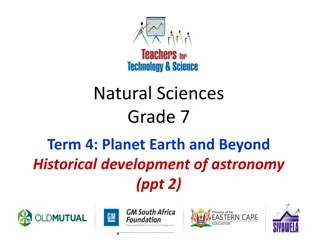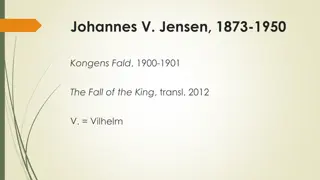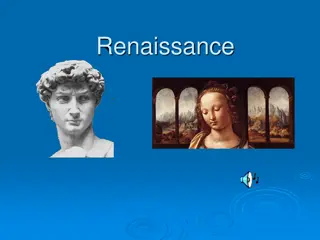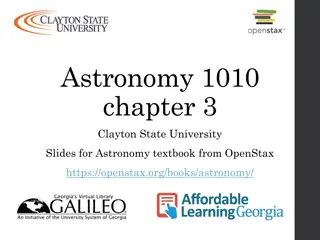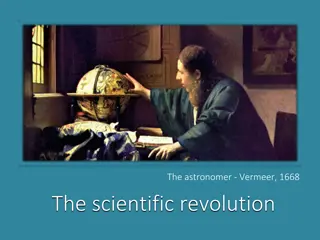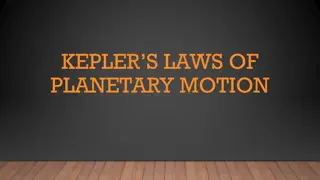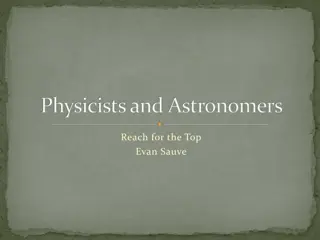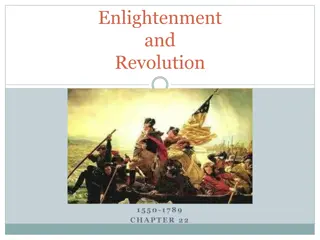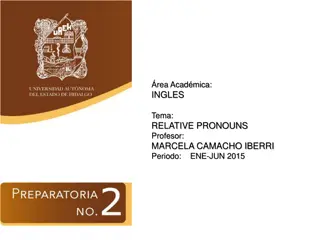Historical Development of Astronomy in Grade 7 Natural Sciences
Explore the historical development of astronomy with renowned figures like Nicolaus Copernicus, Galileo Galilei, and Johannes Kepler. Discover key advancements in our understanding of the solar system and beyond, including the heliocentric model, telescopic observations, and planetary movement laws.
0 views • 10 slides
Life and Literary Works of Johannes V. Jensen: A Nobel Prize Laureate
Johannes V. Jensen (1873-1950) was a prominent Danish writer known for works such as "Kongens Fald" (The Fall of the King). With a diverse literary portfolio comprising poems, articles, and novels, he received the Nobel Prize in Literature in 1944. Jensen's upbringing, career, and notable works are
0 views • 14 slides
The Renaissance: A Period of Innovation and Transformation
The Renaissance period marked a significant shift in European history, bridging the gap between the Middle Ages and the modern era. It was characterized by a renewed focus on humanism, art, education, and science, leading to groundbreaking developments in various fields. This era saw the rise of pri
0 views • 31 slides
Johannes Kepler and His Revolutionary Laws of Planetary Motion
Johannes Kepler, a pivotal figure in the history of astronomy, made groundbreaking discoveries by overturning the geocentric model of the universe. By formulating his three laws of planetary motion, Kepler paved the way for scientific advancements and paved the path for Isaac Newton's law of gravity
0 views • 12 slides
Musical Insights: "The Little Sandman" by Johannes Brahms
Explore the musical richness of "The Little Sandman" by Johannes Brahms through its art song composition, tonality, mood, tempo, and melodic features. Uncover the soothing and gentle qualities of this piece in G major, with a melodic range of a 9th and the use of slurs for smooth articulation. Disco
0 views • 20 slides
The Scientific Revolution: Advancements in Understanding the Natural World
The Scientific Revolution of the 17th and 18th centuries brought significant changes to European thought, with the development of new scientific methods and institutions like the Royal Society in London. Prominent figures such as Galileo Galilei, Johannes Kepler, and Isaac Newton played crucial role
0 views • 8 slides
Understanding Kepler's Laws of Planetary Motion
Explore the fundamental laws discovered by Johannes Kepler in his study of planetary motion. Learn how these laws revolutionized our understanding of the solar system, from the elliptical orbits to the equal area law. Discover the key concepts of focus, eccentricity, aphelion, and perihelion, sheddi
0 views • 21 slides
Influential Scientists in History: Newton, Hawking, Einstein, and Kepler
Explore the remarkable contributions of influential scientists from different eras - Sir Isaac Newton, Stephen Hawking, Albert Einstein, and Johannes Kepler. Learn about Newton's laws of motion, Einstein's theory of relativity, Hawking's work on black holes, and Kepler's laws of planetary motion.
0 views • 10 slides
Enlightenment and Revolution 1550-1789 Chapter 22 Overview
This chapter provides a comprehensive overview of the Enlightenment and Revolution era between 1550-1789. It covers key concepts including the Scientific Revolution, Enlightenment thinkers such as Galileo Galilei, Isaac Newton, John Locke, Voltaire, and more. The vocabulary section introduces terms
0 views • 32 slides
Understanding Relative Pronouns: Key Concepts and Examples
Explore the use of relative pronouns such as "who," "which," and "that" to introduce clauses that provide additional information. Learn how these pronouns relate to the words they modify, with a focus on comprehension and identification in texts describing people, objects, and places. Discover the r
0 views • 16 slides
